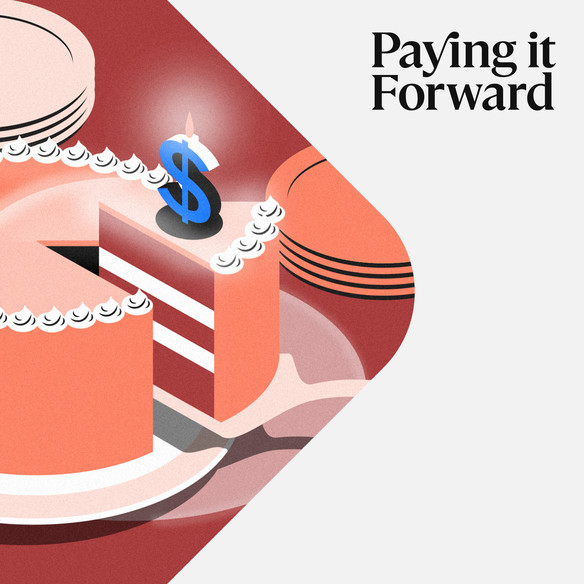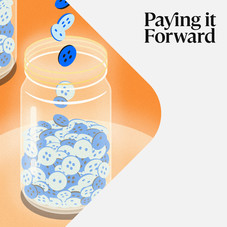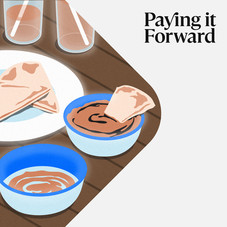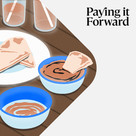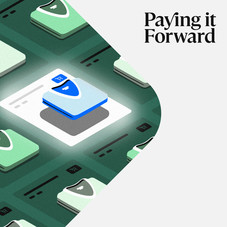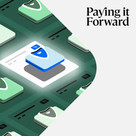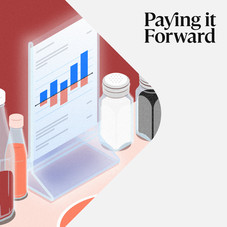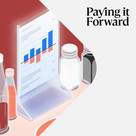Table of contents
When Alison Kenis from Sugar Lab Bake Shop arrived to cater a baby shower, the venue was empty. “It didn’t look like an event was going to happen,” remembers Kenis. “We had everything made and ready to go.” The customer was supposed to pay Kenis for the baked goods at delivery but hadn’t placed a deposit. The mom-to-be was in labor, and Kenis couldn’t get in touch with the grandmother who had placed the order. “So we kind of just chalked it up to a loss. And from then on, I took a deposit for any kind of custom order.”
While hiccups are expected in business, one financial move helped set Kenis and her mother up for success: separating their business and personal finances. “I think that we’ve set off on the right foot now to make sure that if I need business credit, that I can do it. And I don’t necessarily need to rely on my personal finances to be able to get those kinds of loans or credit,” says Kenis.
While it can feel like it’s not a big deal to mix the two, the aftermath can be huge — and preventable. According to financial advisor Priya Malani, making this critical move right when you set up shop is essential. “The reason it’s a good idea not to mix your personal and business finances together is because it essentially erodes the protection that you gained by setting up your business entity in the first place.”
A little bit about this episode on separating personal and business finances …
In our first episode of Paying it Forward, hear financial expert and Stash Wealth CEO Priya Malani explain the importance of separating your business and personal accounts, and give advice on how to do it. You’ll then hear from bakery business owner Alison Kenis who shares how she and her mother keep their finances buttoned up — today and in the future — through two separate bank accounts.
When it comes to running a small business, tackling financial decisions can be daunting and often overwhelming. Each week we’ll focus on a common financial issue, bringing in an expert in the field with actionable insights and a fellow business owner who has tackled it first hand.
Guests
- Alison Kenis, owner of Sugar Lab Bake Shop, a made-to-order bakery in Ventura, California
- Priya Malani, founder and CEO of Stash Wealth, a financial planning and investment management firm in New York, New York
More resources
- Read: Why You Should Separate Your Business and Personal Finances
- Read: 8 Easy ways to Separate Your Personal and Business Finances
- Try: Learn how Square Loans can help your business grow
- Try: See how Square Point of Sale can streamline operations at your bakery
Full transcript:
You’re listening to Paying it Forward, a Square Podcast. When it comes to running a small business, tackling financial decisions can be daunting and often overwhelming. Each week we tackle one issue that could affect your business’ cash flow and hear from a fellow business owner experiencing it first hand.
On today’s episode we talk about separating business and personal finances. According to a 2020 Small Business Credit Survey by the Federal Reserve, 88% of businesses relied on the owner’s personal credit to take on financing in 2019. Of course, this is just one example of many ways business owners combine accounts, but as a new or growing small business it can be tempting to blur those lines and incidentally expose your business to unintended risk.
Priya: Credit, essentially, is your ability to borrow money that you’ll pay back at a later time. And your credit score indicates how good you are at doing that. Think of it like a report card, like a grade on your report card, except it’s on the topic of money, specifically how good you are at borrowing it and repaying it.
That’s Priya Malani, founder and CEO of Stash Wealth, a financial planning and investment firm. As small business owners open their businesses, start establishing a business credit score, and look to potentially leverage their business credit, she says mixing business and personal finances together can cause trouble down the road.
Priya: So you can borrow money in your personal life and repay it like you do with a credit card, then you can also do that on the business side of things — whether it’s through a business loan or a business credit card, that same procedure applies. When you run a business, you have a personal credit score and you also have a business credit score. And you don’t have a business credit score immediately just because you start a business, you actually have to start building your business credit score. You would want to open up a business checking account, a business credit card, and then not only just opening it, but immediately start using it. If you open a business credit card and you just sit on it, that actually can hurt your business credit score, which is a little bit different than a personal credit score, where that isn’t necessarily the case.
And your credit score is so, so important because, like I said, it’s that grade on your report card. The better the grade is the better the terms are on the money that you’re trying to borrow. And what I mean by “terms” are, things like interest rate, repayment, timeframe, and essentially the better your credit score, the better those terms will be, and the lower the amount of money you’ll have to repay in the long run. The reason it’s a good idea not to mix your personal and business finances together is because it essentially erodes the protection that you’ve gained by setting up your business entity in the first place. So when you set up an LLC, or you set up an S Corp, it’s because you want to delineate between your personal finances and your business finances. And if you start mixing the two together, let me tell you, it doesn’t take a lot for a lawyer to want to take advantage of you if you’re making some rookie mistakes. So keeping those separate, not using your personal credit card to pay for business expenses is super, super important.
Ultimately, what it does is, it just makes it so much harder for you to track what is business and what is personal, and the reason that’s important is because come tax time, you want to take advantage of as many tax deductions as you can. And of course you can’t take advantage of it if you’ve made a purchase that’s a business purchase on your personal account. You can’t then take that as a tax deduction if it’s not applicable for deduction. So it can make it very tricky to really handle the accounting.
As it is, as a small business owner, you have so many things to think about that it’s really nice that if you go to your business credit card and you open up that statement, you know you can pick from any of those charges and understand what could potentially help you at tax time. Opening yourself up from protection by essentially making your personal assets on the table in the case of a liability. You don’t want lawyers coming after your personal assets.
Our guest today is Alison Kenis, co-owner of a mother-daughter bakery based in Ventura, California. They opened their doors in spring of 2012, operating out of an industrial commercial kitchen before expanding to a made-to-order business, and finally into a brick-and-mortar retail shop. When it comes to business and family, what is the secret ingredient to their success?
Alison: I started my business with my mom, it’ll be nine years ago next week. So we’re celebrating a pretty big milestone for us. And we started as a made-to-order bakery. So you had to call ahead. We operated out of a commercial kitchen because when we started the cottage food law didn’t exist in California. So it was illegal to operate out of your home. And we rented a 500-square-foot kitchen. It was small. I answered all the calls on my cell phone. I still worked part time as a cashier, and my mom still worked full time for the county, and we just slowly expanded and started getting more orders. And then about a year and a half after that we opened a really tiny retail shop because we had so many people asking us if they could come in and buy a couple cupcakes, but we had minimums of course.
We actually ended up outgrowing that space and moved to a shopping center. Most recently, we just moved again, and now we’re in a harbor, so there’s a lot more foot traffic and a lot more tourist traffic, so our sales have just skyrocketed since we’ve moved, which is pretty awesome.
Alison was 22 when the business first launched, and as both she and her mom were still working day jobs, separating business and personal accounts helped them keep track of their finances.
Alison: We, from the beginning, have kept everything separate. That was one of the first things that we did when we started our business — was seek out a bank to do our business account. So we actually had to go to a different bank than where my mom and I personally bank, because at the time they didn’t offer business accounts for partnerships, which is what we were when we started. Now we’re an LLC, so I think it’s a little different in terms of banking, but we got a bank account right away that was business-related. So that way all of our credit card transactions went there, all of our payments went through there, and so we’ve really tried to keep everything separate.
Every now and then I’ll forget, and I’ll accidentally pay something with the business card. So then I just write a personal check to the business or vice versa. If I ever had to use my personal card, we make sure that we’re accounting for that, and so everything is where it should be. I think it was something super important to have that separation, especially because it was a partnership with my mom, that we didn’t want any miscommunication with funds, that we wanted to make sure that everything that was for the business went to the business. So we had a business checking account, and I think a savings account may have been included in it, but we didn’t use it in the beginning. I don’t even know if we use it now, to be honest. But we also got a business credit card. We’ve made sure that those payments are coming from the business and that we’re tracking them on our books as the right business expense, and then just paying for it on our own credit card, but then using the shop money to pay off that credit card.
One thing I wish I would’ve done sooner in my business, financially, was knowing my numbers and actually understanding my costs. Because while we had a good bank account set up, there were some things that I didn’t realize we were actually losing money off right away. I looked at what other people were charging, and so I thought, “Oh yeah, that seems like a good price for that brownie.” And then I do my math and apparently I’m using more expensive ingredients, and so I had to actually raise the price as soon as I saw it because we were losing money just by people buying them. So that’s something I wish I would have done much sooner in the beginning of the business.
When the bakery transitioned to a made-to-order business, everything from taking customer orders to placing ingredient orders fell on Alison. As they started hiring more staff, she says having systems in place was critical.
Alison: So as we’ve expanded, and we’re going through a growth right now, too, with bringing on more staff, it’s making sure that we have the systems in place so that we can make sure that everything is going the way we want it to in terms of customer interaction. But then also making sure we’re taking those (systems in place) for larger orders, or that things are covered. And so it’s just more check-ins. And so it seems like it adds to the to-do list, but those items on the to-do list are so important to make sure that the financial health of the business is strong so that we can continue to grow and expand and have the money to fix things if something goes wrong. So that’s really important to come up with those systems.
And a lot of times you don’t know what systems you need until you realize you need something there, and that’s where you can give yourself some grace as a business owner. And you don’t know everything until you know it.
As fate would have it, early on in their made-to-order business, Alison learned the hard way that the bakery would need to take deposits for large orders.
Alison: It was still when we were made to order, I had someone that was ordering for a baby shower, and I don’t even remember the full order, but it felt large at the time. I think now it wouldn’t feel as large. And I was going to be delivering it. And so my mom and I went to go deliver, and no one was at the venue. It was at a garden in a town near us and nobody was there and there were just people landscaping, but it didn’t look like an event was about to happen. And so we get in touch with somebody that runs that venue that then said, “Oh no, it got canceled.” Because the mom-to-be actually went into labor the day before, which surprisingly has happened more often that the mom-to-be gives birth before the baby shower has happened. But this customer hadn’t placed any deposit, hadn’t paid for anything. They just had an order and they were going to pay us at delivery.
I tried getting into contact with anybody who could help. We could drop it off somewhere, at least, because we had everything made and ready to go. And we ended up somehow getting in touch with the mom-to-be, and she basically said, “Oh my mom was supposed to cancel it, deal with her,” but we never got the mom’s information. So we kind of just chalked it up to a loss. And from then on I took a deposit for any kind of custom order.
And then it has sort of morphed over the years — now we have if it’s over $100, you pay a 50% deposit. If it’s under $100, you’re paying in full, because we’ve just had too many people order and not show up. And then we’re out that time and that product. Sometimes we’re able to sell it, but if we’re not then it’s a loss and some things have such small margins to begin with that that loss really kills us. So it’s one of those lessons learned that you come up with those systems, and it’s something that we still chuckle about now that, “Oh yeah, you remember that baby shower that never did anything?”
You’re trying new ways to sell, making tough financial decisions, doing what it takes to make your business succeed. You aren’t alone. Join us on Square’s Talking Squarely podcast, where independent business owners just like you get real about the ups and downs of running a business. Listen and subscribe to Talking Squarely.
Alison: There have been so many times where I almost get overwhelmed with decisions. And as a business owner, you’re going to have decision fatigue at some point. Because especially when you’re by yourself, you’re making every decision and you’re wearing all of the hats. But especially as you grow and expand, those easy decisions, they’re going to get even easier and not even feel like a major decision. But you’re going to have more and more decisions as you grow and start thinking on a higher level.
And so sometimes you just have to pick an option and also know that if you go with your gut and your gut was wrong, that you can fix it. Everything is fixable too, for the most part. And so you can adapt and change and just try something. This is what it feels like the answer should be, so I’m going to go with it and then test it and see how it’s going, no matter what the decision is. If it’s whether to start with a family member as your partner or bring on friends as employees, which I learned not to do pretty early on. Or whatever decision it is, just making it. Don’t get afraid to make a decision because you know that most things can be fixed or figure-out-able or changed once you get new information.
As the business has grown, so has Alison’s role as a true business owner. Looking back, she feels like separating accounts from the beginning could give her leverage for future business decisions.
Alison: My mom has been more of the financial side of the business, especially when we started. She was the one in charge of paying the bills and keeping an eye on the bank account while I did all of the production and the creative side of things. But especially as we’ve grown. And I’ve also grown into the role of business owner more, so once we had staff and just the expansion, I’ve learned more about the books and having that kind of business credit.
And so far, we haven’t had to take out any loans. It’s all been personally financed. So that’s been helpful. But eventually if, decades down the road, when my mom is no longer living and it’s just myself, I might have to take out a business loan for an expansion or a new location if we decide to go that route. And so I think that we’ve set out on the right foot now to make sure that if I need business credit, that I can do it. And I don’t necessarily need to rely on my personal finances to be able to get those kinds of loans or credit.
If you’re launching your small business or growing it, Alison shares this piece of advice.
Alison: It’s never too late to open that business account if you haven’t already. I know sometimes people kind of luck into a business. That’s kind of how we started after I graduated college and moved back home, and people realize I baked and I made cakes. They’re like, “Oh, how much do you charge?” So I kind of lucked into a business. It was something that I knew shortly after I graduated that that’s what I wanted to do, but I also had no idea what I was doing, even in the beginning of the business.
So I think if you haven’t started a business account yet, it’s not too late, and I definitely would recommend it. Because then you can also show more easily where your business has come from. The growth of your finances for the business, and sometimes that might mean you need to borrow a little bit personally and kind of just keep track of that. But I think if you don’t have a business account yet, definitely get one, and then that way you can keep those things separate, because I know especially in the beginning, I didn’t have a budget personally, so it was much easier to just focus on the business budget and not have to have those two intertwined.
Thank you to Priya Malani and Alison Kenis for their thoughts on growing a business while managing business and personal finances.
Priya Malani is founder and CEO of Stash Wealth, a financial planning and investment management firm. Alison Kenis is co-owner of Sugar Lab Bake Shop. Find them on Sugar Lab Bake Shop’s Facebook and Instagram, or at sugarlabbakeshop.com. Give them a follow, or if you’re in town, Alison says to stop by for a tasty treat.
If you want to hear more like this, make sure to subscribe to Paying it Forward on Apple Podcasts, Spotify, or your podcast app of choice. You’ve been listening to Paying it Forward, a Square production. This episode was produced by Deborah Findling, Camille Kail, and Clara Shannon. Our music was composed by Jordain Wallace with sound recording by Sorrentino Media and D.R. Baker. Thanks for listening.
This podcast is for educational purposes, and does not constitute legal, financial, or tax advice. For specific advice applicable to your business, please contact a professional.
![]()

